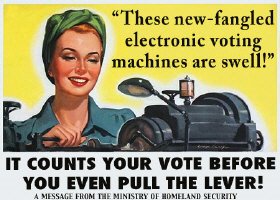Thursday, September 21, 2006
Congressional Approval Rate Dismal

They will need to put an extra special tweaking on the electronic voting systems to deal with numbers like this:
With barely seven weeks until the midterm elections, Americans have an overwhelmingly negative view of the Republican-controlled Congress, with substantial majorities saying that they disapprove of the job it is doing and that its members do not deserve re-election, according to the latest New York Times/CBS News poll.
The disdain for Congress is as intense as it has been since 1994, when Republicans captured 52 seats to end 40 years of Democratic control of the House and retook the Senate as well. It underlines the challenge the Republican Party faces in trying to hold on to power in the face of a surge in anti-incumbent sentiment.
By broad margins, respondents said that members of Congress were too tied to special interests and that they did not understand the needs and problems of average Americans. Two-thirds said Congress had accomplished less than it typically did in a two-year session; most said they could not name a single major piece of legislation that cleared this Congress. Just 25 percent said they approved of the way Congress was doing its job. ...
In one striking finding, 77 percent of respondents -- including 65 percent of Republicans -- said most members of Congress had not done a good enough job to deserve re-election and that it was time to give a new people a chance. That is the highest number of voters saying it is "time for new people" since the fall of 1994. ...
In the poll, 50 percent said they would support a Democrat in the fall Congressional elections, compared with 35 percent who said they would support a Republican. But the poll found that Democrats continued to struggle to offer a strong case for turning government control over to them; only 38 percent said the Democrats had a clear plan for how they would run the country, compared with 45 percent who said the Republicans had offered a clear plan.
Overall discontent with Congress or Washington does not necessarily signify how people will vote when they see the familiar name of their member of Congress on the ballot, however. Democrats face substantial institutional obstacles in trying to repeat what Republicans accomplished in 1994, including a Republican financial advantage and the fact that far fewer seats are in play.
And the "tamper-proof" electronic voting technology.


